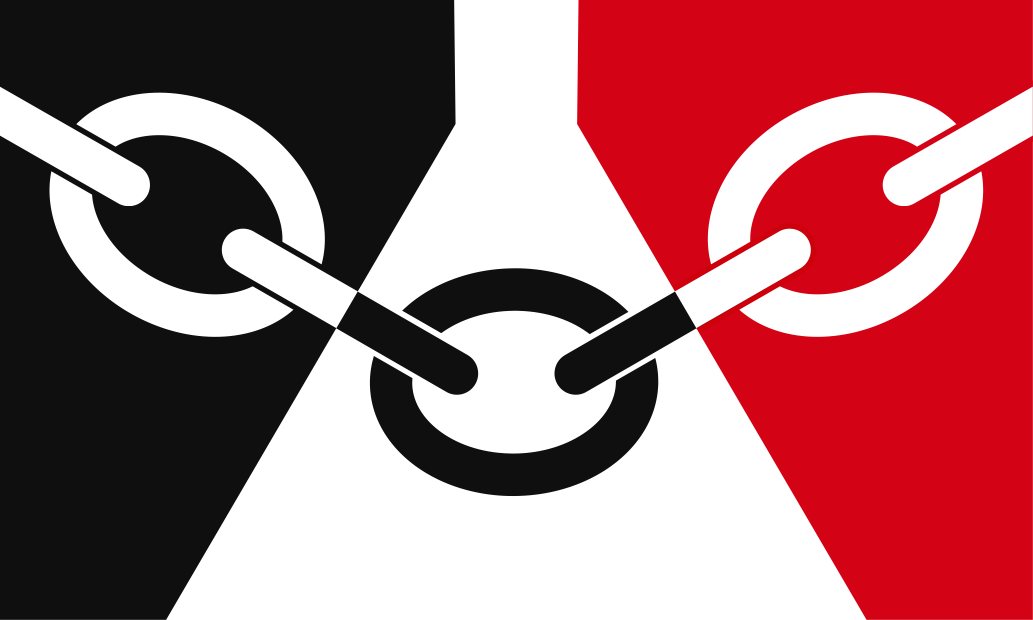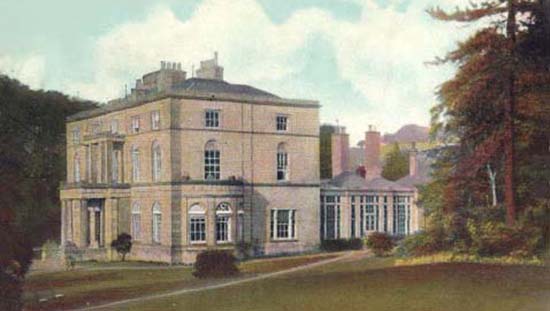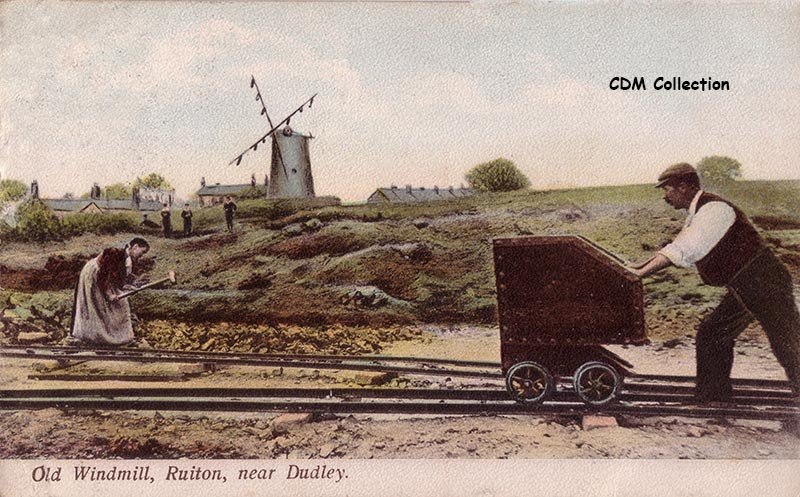
|

|
|
|
Landmarks ~
Churches ~
Pubs ~
Shops ~
Amenities ~
Dwellings ~
Events ~
Schools ~
Sports
Industrial ~ Transport ~ Folklore ~ Families
~ Families and People ~
Gornal's Famous
John Turton Fereday ~
John Lloyd Gibbons ~
George Kirby ~
James Yates Rooker ~
John Johnson Shaw
Theodosius Theodosius ~ Ruiton Travellers ~ Singing Miners
The Hawkers of Ruiton.
The Ruiton 'Travellers' started out carting locally quarried and ground fine sand around the Black Country,
the sand was extensively used for scouring floors and cooking vessels.
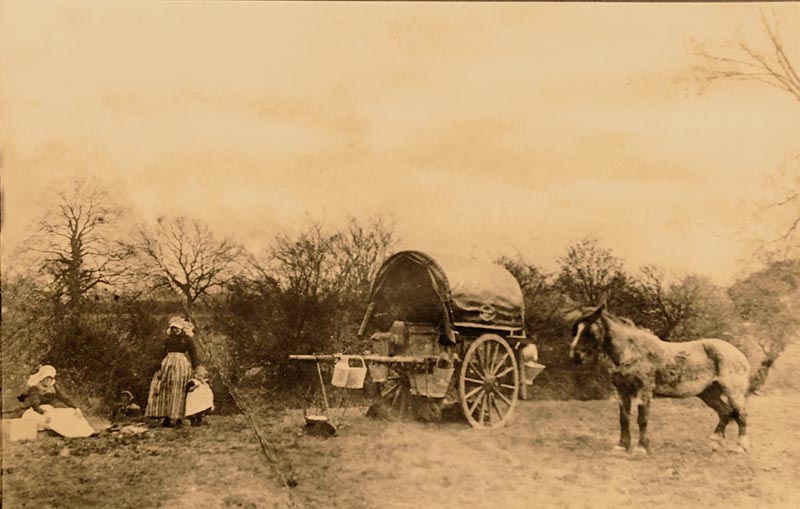 A typical scene of Black Country travellers in early Spring 1900.
A typical scene of Black Country travellers in early Spring 1900.
The Travellers extended their trade to include other wares, and in the later part of the 19th Century, they
also included salt fetched from Droitwich, and it was for the salt that they became widely known.
They travelled throughout the country during Spring and Summer, returning to their base in Ruiton by Wintertime.
Apart from domestic use, salt blocks were used for cattle 'licks',
thus they had a good market in the agricutural areas too, and wares like nails (for shoeing),
pots and pans etc., would be hawked around the farms which could also provide a resting place
for their overnight stay.
This undertaking continued on until at least the 1930s as the news snippet below shows.
Several Ruiton families were hawkers, the Wattons and Harpers are featured later,
there was much inter-marrying among these clans.
This newspaper article by 'The Clubman' appeared in the Birmingham Post, 1932.
GORNAL'S CURIOUS CLAN
In the course of my wanderings the other day I alighted on a remarkable Midlands clan whom generations do not
seem to affect in customs, dress, or speech. I refer to the Gornal Salt-sellers who trade between Droitwich
and the Black Country.
The spectacle of a string of horse-drawn vehicles each laden with huge bricks of salt which I saw pass through Dudley prompted me to question one of the sellers, who appeared to be a leader of his tribe. There were probably a dozen vehicles, each accompanied by a woman wearing sunbonnet and shawl. It appears that every morning these women and their menfolk (the later generally sit on the carts while the women plod alongside) leave Dudley with their big consignments of salt and proceed in varying directions, returning in the afternoon, always with empty carts.
Old-World Names
This trade is essentially a Gornal occupation, though the popular belief that the salt is mined in Gornal
itself is, of course, incorrect. The sale of it apparently, is a very profitable one, for it is well-known
that these Gornal people are all fairly well-to-do.
They are a distinctive type, and so clannish that they rarely marry out of their own community. Thus the surnames among them are limited, and to locate any particular man it is necessary to enquire for him by his Christian name. Similarly there is very little variety in the Christian names of the women, and such names as Patience, Faith, Hope and Charity being common. Their ponies are an obsession with them. They generally are well-groomed, with harness which is spotlessly clean. ~
The Wattons and Harpers of Ruiton.
The Watton family dynasty in Ruiton and Gornal go back at least as far as
the 17th Century, their family structure is complex,
with so many generations,
here we deal with one notable branch of this extensive family.
Thanks to Margaret Watton for the original research & extensive
work on the family history and to Lucy Watton
for supplying the content and pictures.
The story here starts in the 19th Century with the
marriage of William Watton to Ann Marsh.
One of their children, Annie Watton, who was born in 1885, married William Harper on 25th December 1911. Their daughter Annie Matilda Harper, born 1915, gave numerous testimonials regarding her families activities.
Lucy Watton explains:-
"William Watton died at the age of 55 and his wife Ann continued to run what was the family business. I'm told she was a very hard woman and not well liked. Her children all worked very hard for her, they had no choice. William's granddaughter Annie Harper told me that in the early days William sold salt from a packhorse with baskets on the side. Often he had no shoes to wear, so worked barefoot. I have spoken to Annie Harper many times (1990s), who still lives in Ruiton and likes nothing better than talking over old times. She is a very pleasant tiny woman who isn't in the best of health but gets on with life.
Annie has given me lots of information into the way the travellers lived.
She was the only surviving child of Ann (nee Watton) and William Harper.
The Harpers never dealt in salt, their trade was nails and such like
and each spring they set off to visit their annual customers knowing who
wanted what and where they would trade best.
The Harpers purchased their wagons from a wheelwright in Kent Street,
Upper Gornal.
It was a hard life but a pleasant one and they were on the road from April to October (as Annie put it 'from spring to the back end'). During one journey, Annie's mom who was heavily pregnant, had trouble with the horse and as a result had her twin boys early. Unfortunately they died shortly after birth.
Annie said she once asked her mother why she and her dad had married.
William Harper died 13 November, 1971 aged 84 years.
Annie Harper wearing the distinctive
sunbonnet and shawl worn by the women folk.  William and Annie Harper with daughter Annie Matilda, 1922
William and Annie Harper with daughter Annie Matilda, 1922
 Annie Harper (nee Watton), boy is farmers son.
Annie Harper (nee Watton), boy is farmers son.
 Annie Matilda Harper, in the familiar hooped cart, 1936.
Annie Matilda Harper, in the familiar hooped cart, 1936.
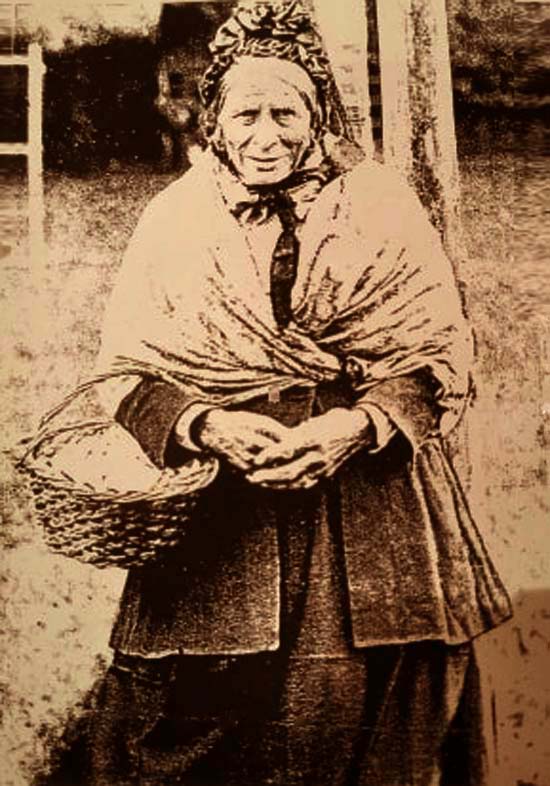 Annie Harper (nee Watton) daughter of William (b 1885) and Ann Watton.
Annie Harper (nee Watton) daughter of William (b 1885) and Ann Watton.
~
Several families in Ruiton are described as Hawkers or Salt Hawkers in the 1901 Census,
including: Henry Stanley, hawker of salt, Ox Street; Henry Watton, hawker, Ox Street;
Joseph Watton, hawker, Ox Street; John Collins, hawker, Ox Street.
John Harper, salt hawker, Hill Street; Henry Walker, salt hawker, Hill Street. There were surely many more but would have normally been away during the Census period. ~
|
|
|
